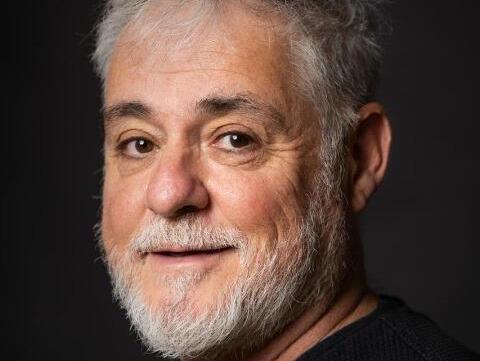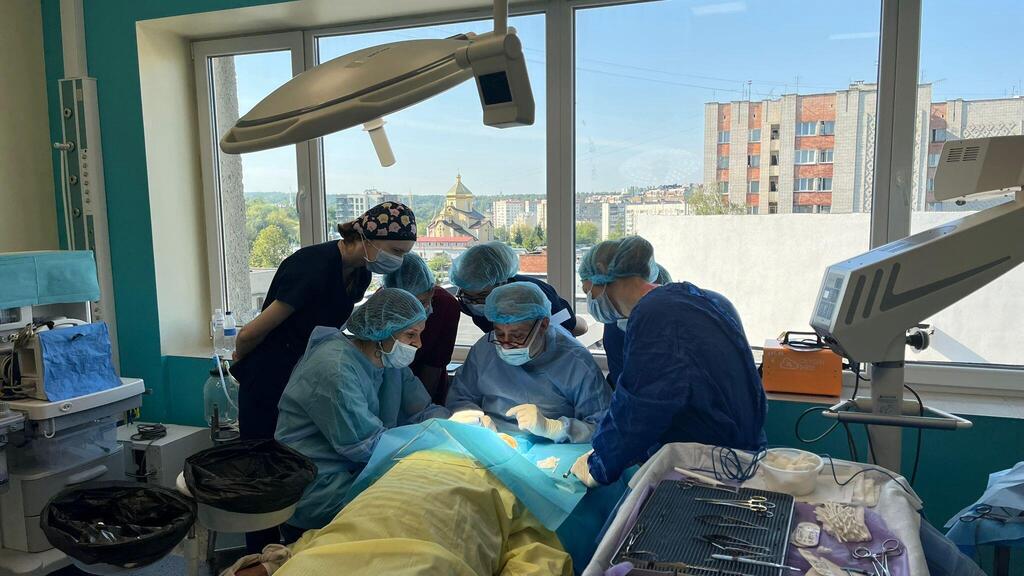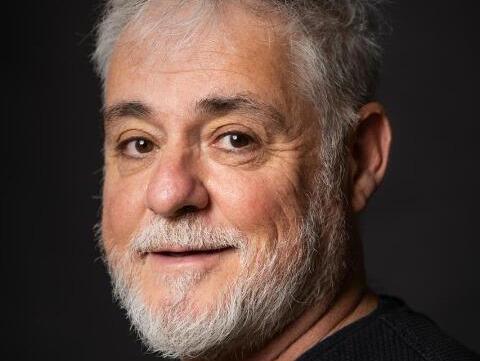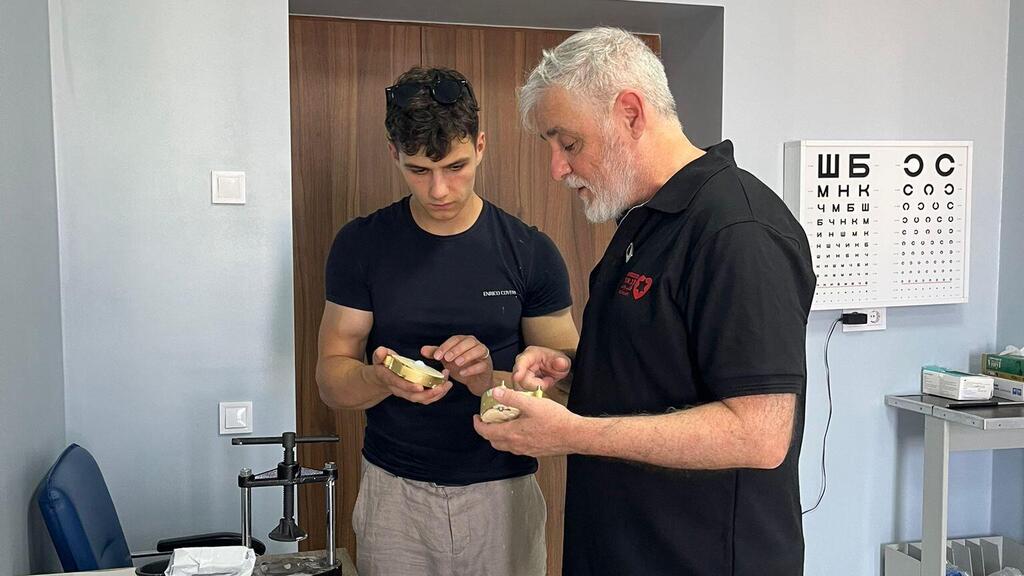
Eye of the beholder: Eye prosthetics expert restores soldiers’ self-esteem
Dr. Yoav Vardizer, a senior ophthalmologist at Haifa’s Bnai Zion Medical Center and a global expert in eye prosthetics, operates on soldiers who have lost their sight in battle since October 7th, “Prosthetic surgery gives patients the self confidence to go forward with their lives”.
Saying that his profession runs in the family is a gross understatement for Dr. Yoav Vardizer, senior ophthalmologist at Bnai Zion Medical Center in Haifa. His maternal grandfather was a pioneer in the field in the early days of the state, his mother was an orthoptist who became an ocularist, and he has followed in their footsteps. “I guess you could say it’s in my blood,” Vardizer says with a smile.
Oculoplastics is a specialty intended for specialist ophthalmologists, and deals with surgeries and treatments of the eyelids, the eye socket, and tear ducts. Oculoplasty touches on other medical specialties such as plastic surgery, otolaryngology, mouth and jaw and neurosurgery. The need for the profession arose from the desire to protect the eye and visual functions during operations in an anatomical area close to the eye and of functional importance in maintaining it. Bnai Zion hospital in Haifa performs around 500 of these procedures each year.
“Since the war began on October 7th of last year, in my clinic we have treated around 20 patients, soldiers that had either lost their eyes or lost their vision and needed to be treated prosthetically because of the war,” Vardizer told CTech. He noted that most IDF combat soldiers do wear protective goggles or glasses, which prevents such eye injuries and is the reason there are not more cases, but for those who don’t, or remove them even briefly, the effects can be severe.
I understand the procedure you perform does not restore sight to the eyes.
“That’s correct. It does not restore eyesight. The main reason for this surgery is to give patients the self confidence to continue their lives as before. Many patients say that they don't feel confident with only one eye. It’s really a rehabilitation surgery.
“Consider a young IDF soldier that lost their eye or has a terrible scar around their eye. In that situation it is very hard to maintain your social life as it was prior to the injury because most people you encounter are frightened to look at someone who doesn’t have an eye. So, if you want to return to your career, your family, your normal social routine, it requires a long rehabilitation.
“When you meet a new person, the first thing you do is you look them in the eye. If something happens to the back of your ear, it’s not that important or noticeable, but the eyes are the way we make social connections. So it’s very important for our patients to try to look the same so that others will not be bothered by looking at them. This is the most important thing about this surgery and the rehabilitation of these patients.”
When the procedure is done, is it noticeable?
“It depends. If a patient had just lost an eye, you would not be able to tell. However, if there is a huge distortion of the soft tissue around the eye, then the difference between the two sides would be noticeable. Our goal is to first try to rehabilitate the soft tissue around the eye and the bones in the orbit so it would support a prosthesis in a good way and then make the best prosthesis possible, so together the surgery and the prosthesis would give the result that would not be noticeable.”
Have some soldiers you’ve treated returned to their units?
“Yes. I have many patients that are eager to go back to the army and are waiting for me to either finish the surgery or the prosthetic treatment so they would be able to go back to their units. A few of them are even combat soldiers who have returned to their units after having lost one eye.”
Tell me about the prosthetics. Are they made on site?
“Yes, everything is custom made for each individual patient here in the clinic.”
Do they ever need to be replaced?
“Yes, usually they need to be replaced every five years. Think of how you looked five years ago and how your body has changed. The same goes for our patients. The prosthetic doesn’t change, but the person around it does.”
In your field, where does tech meet medicine?
“The work itself is a bit like jewelry, there is a lot of manual work that needs to be done. We sculpt the shape of the prosthesis, we paint the colors, and we do it all manually. But in the last few years we started using special facial scanners, special 3D printers and special color printers that are made for compatible materials for medical uses for patients. We don’t use them in the final product yet, but in the process of making the final product. For example, making the color is tedious work, so we started using a special color printer that we imported to Israel especially for that to adjust the color a bit more.”
What will your profession look like going forward?
“It will look much different with more integration of cutting edge technology like the scanners and printers. It opens up all sorts of possibilities in this field that I - and my mother before me, and certainly my grandfather - could never imagine. Things are changing constantly. For example, our clinic just got a new specialized printer which I just heard about its cutting edge technology half a year ago.”
Dr. Vardizer’s expertise is not limited to Israel. He has been on missions around the world to perform these surgeries including an expedition to Abidjan, the capital of the Ivory Coast in 2003, expeditions to Paramaribo, the capital of Suriname (Dutch Guiana) in 2004, 2006, an expedition to the Marshall Islands and Micronesia in 2011, and an expedition to Jinka in southern Ethiopia in 2012.
“As an Israeli, do you feel a special sense of pride, helping patients around the globe?”
“A few weeks ago I went on a mission to Ukraine together with an organization called Lev Echad (One Heart) which is a civilian response organization that mobilizes hundreds of thousands of volunteers in times of emergency and crisis, in Israel and worldwide. Lev Echad has been helping Ukraine since the start of the war over there and they approached me to set up a prosthetic service in Lvov. I went over there to perform a few operations and brought over all the equipment needed and we opened a small clinic there.
3 View gallery


Dr. Vardizer performs surgery in Ukraine
(Dr. Yoav Vardizer, Bnai Zion Medical Center)
“These are the same operations as I perform in Israel but I am always amazed at how much knowledge we have in Israel compared to other much larger (and often wealthier) countries. This is what we can offer the world. In Ukraine they are also at war now and they have so many patients who need these types of surgery. We in Israel can use our medical and technological know-how and expertise and share it with the world. Medicine in Israel is at a very high level, there is so much we can give to others.”
When asked what’s the most important message he wants to convey, Dr. Vardizer said, “My prosthetic patients, the IDF soldiers, should not fear being accepted in society. They should not be ashamed of having a prosthetic eye, on the contrary, they should be proud of what they have done to serve us all and society should admire them for all that they have done.
“If you get wounded, you need to chart a new course. If you lose a leg, you probably cannot climb a mountain, but if you lose one eye, there’s nothing you cannot do throughout your life. You should feel like the sky’s the limit.”
















